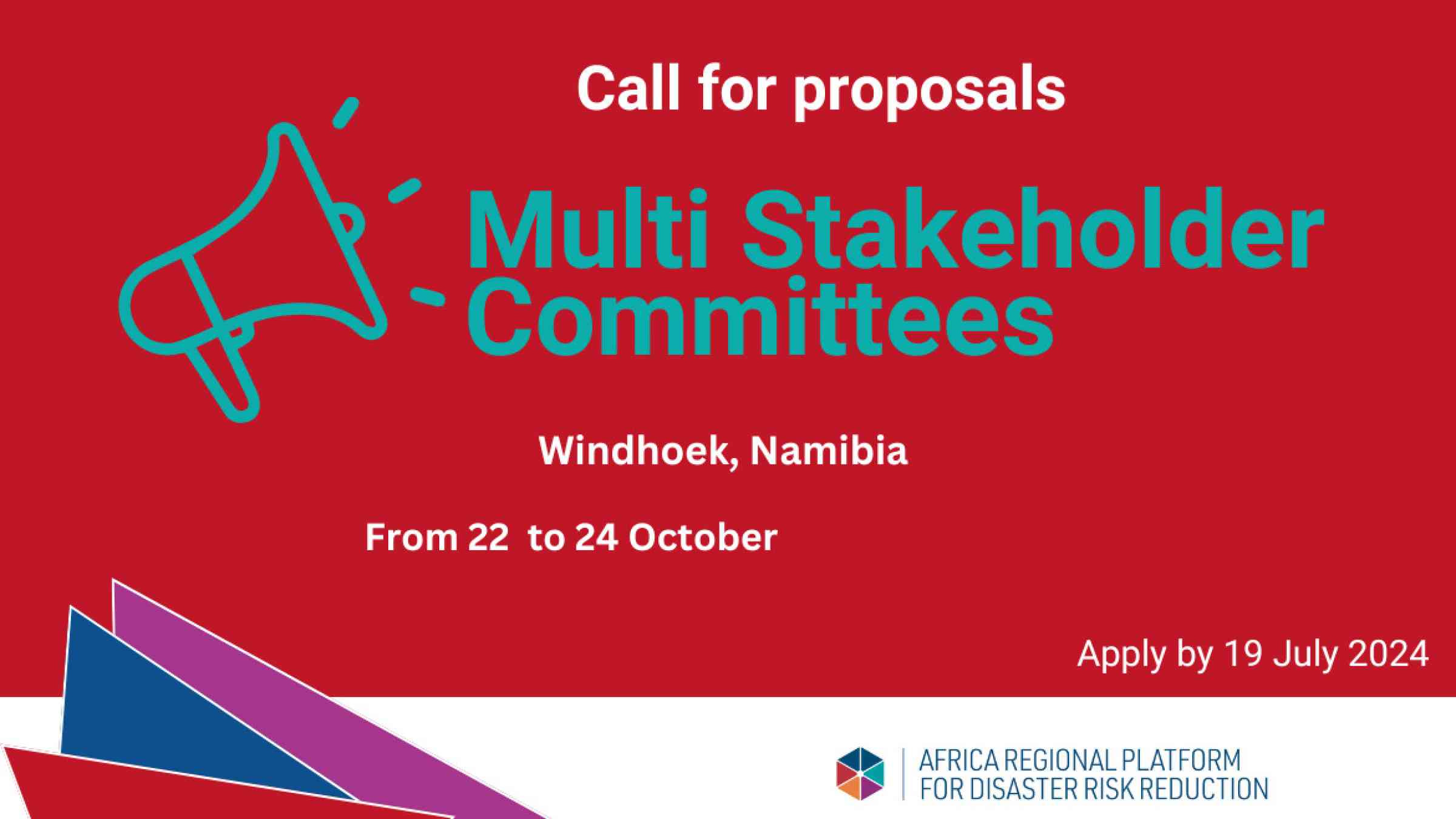Multi Stakeholder Committees at the 9th Africa Regional Platform for DRR [Application is closed]

Registration is now closed, applicants who have already applied will be advised if successful within two weeks from the close of applications
Multi Stakeholder Committees at the 9th Africa Regional Platform for DRR
The AfRP-9 and the 8th High Level Meeting on Disaster Risk Reduction is organized by the African Union Commission (AUC) and the United Nations Office for Disaster Risk Reduction (UNDRR) in collaboration with the Southern African Development Community (SADC). To create the best possible AfRP-9, committees will be formed to shape the AfRP-9 through their collective thought leadership and expert advice. Committees are expected to deliver quality outputs in a timely manner.
The AfRP-9 will focus on the following three critical issues or most important to the risk reduction and resilience building agenda today:
Applying Risk Information for Transformative Governance
Investing to Reduce Risk: Changing the way money is spent
Reducing Loss and Damage: Saving lives and protecting investments
A Committee will be established for each of the following:
Pre-Conference Stakeholder Consultations: Support the development and organization of the Stakeholder Engagement Consultations during the preconference day on 21 October 2024. The Consultations provide an avenue for UN Major Groups and Other Stakeholders (Children and Youth, Disability Inclusion, Gender, Local Authorities, Media, Private Sector, Science and Technology, etc.) to convene amongst themselves and develop voluntary commitments, stakeholder position statements, and key messages for accelerating implementation of the Sendai Framework in Africa. The Committee is expected to produce the following substantive outputs:
A Concept Note including a snapshot of frontier thinking on course correction towards 2030 with expected outcomes and guided questions for the consultations.
Proposal on the Format of Discussion: Weigh in on how to format and sequence the consultations to optimize expected outcomes and maximise stakeholder interaction and participation.
Moderation and Rapporteur Forms to guide the Consultation Sessions and capture Session Notes and Outcome Recommendations
Stakeholder Representatives for the Drafting Committee for the Windhoek Declaration: Serve as members of the Drafting Committee for the Windhoek Declaration. Participate in meetings to review and provide inputs to the draft declaration considering inputs from various conference sessions. Coordinate inputs from broader stakeholder groups into the different iterations of the Windhoek Declaration.
Programme Development Committee: Review concept notes for all sessions (plenaries, thematic sessions, working sessions, and learning labs) providing feedback to ensure alignment with the Platform's goals and latest disaster risk reduction challenges, needs and good practices in Africa. Support Session Leads in identifying diverse speakers, panellist, and facilitators to ensure diverse experience is represented across the various sessions. Provide on-site support by assisting with session organization and acting as rapporteurs for various sessions.
Eligibility
Each Committee is expected to comprise of 5 to 10 experts. Representatives of the following entities are eligible to apply:
Member States
UN Major Groups and other Stakeholders (MGoS); UNDRR groups and stakeholders mentioned in the Sendai Framework but not covered by the MGoS; and Civil Society Organisation Groups focusing on specific 2030 Agenda policy processes.
UN System entities and other international and regional organizations
Subject matter experts, researchers and practitioners that have expertise relevant to the topic of the session.
Selection Criteria
Upon a review of the applications received, UNDRR will form the Organizing Committees, ensuring overall broad and equitable representation among Organizing Committees based on the following principles:
Relevant expertise
Experience in Multistakeholder engagement
Diversity and inclusion, and all-of-society approach
Geographical balance
Gender balance
Responsibilities of the Committees
We aim to inform selected Organizing Committee members before the end of July 2024. The work of the Organizing Committees is expected to begin shortly thereafter. The time commitment requested from an Organizing Committee member from the period July 2024 to October 2024 is estimated to be 50 to 75 hours. The work of each Committee will be guided by the AfRP-9 Secretariat, who will facilitate the discussions and the timely preparation of outputs from the Committees. To conduct their work, Organizing Committees may hold meetings or workshops, communicate via group e-mails, and engage and consult widely with relevant communities of practice for topic concerned.
Proposals will be subject to logistical feasibility. Queries and clarifications can be directed to [email protected], copying [email protected]